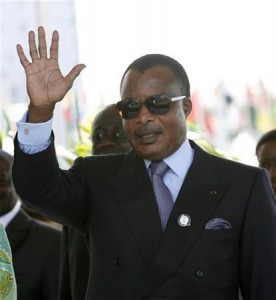
Reuters | Wed Sep 23, 2009
By Claudia Parsons
NEW YORK (Reuters) - The Republic of Congo expects to finalize a multimillion hectare land deal with South African farmers by the end of this year, Congo President Denis Sassou-Nguesso said on Tuesday.
The deal, initially meant to give South African farmers 10 million hectares (24.7 million acres) of land to grow maize and soya beans, raise poultry and run dairy farms, was delayed by Congo's elections in July, won by Sassou-Nguesso.
First drafted as a 99-year lease, the deal could be one of the largest of its kind in Africa, where countries with more developed agricultural systems are seeking to expand in a trend advocates say will help modernize farming in poorer countries.
Sassou-Nguesso said in an interview he had spoken to South African President Jacob Zuma in New York, where both were attending the United Nations General Assembly.
Sassou-Nguesso said they discussed him making a state visit to South Africa before the end of the year, and he hoped to finalize the land deal on that occasion.
"We think this might happen before the end of this year," he said, adding that nothing had been finalized.
In August, the oil-producing central African nation said the deal needed to be changed as there were misunderstandings and the project risked depriving local farmers of land.
Asked whether the deal would still involve between 8 million and 10 million hectares of land, Sassou-Nguesso said: "We will only know exactly the numbers once our contracts are completed. It's not a closed number, this can change."
SCRAMBLE FOR LAND IN AFRICA
South Africa has one of the most developed agriculture sectors on the continent and its farmers are looking to expand into other countries. They are joined in the scramble for land by rivals from Italy, France, Turkey, China and Israel.
Analysts point to potentially huge rewards in investing in farmland as the world population grows, while many see climate change and biofuels choking off the supply of arable land.
Advocates of such land deals say they can act as a motor for development of the farm sectors of poor countries, while critics warn of a land grab to the detriment of local farmers.
Sassou-Nguesso, who has been in and out of power in Africa's No. 5 oil producer since a 1979 coup, won the July 12 election with 78 percent of the vote. The result was dismissed by the opposition, after rivals were banned or withdrew.
Sassou-Nguesso said Congo also expected to reach completion point of the joint World Bank and International Monetary Fund's Highly Indebted Poor Countries debt relief scheme by the end of this year.
Congo's economy is heavily dependent on its 220,000 barrels per day oil output, but Sassou-Nguesso said plans to diversify the economy were under way. He said Congo offered good potential for investors in electricity, through building dams.
"South Africa for example can eventually import electricity from the Congo Basin," he said.
Asked what he was doing to reassure investors that corruption would not be a problem, Sassou-Nguesso said: "Where is the corruption? It's about production of electricity, there's no possible corruption.
"All of Africa needs electricity and whoever invests in this sector will reap benefits because they will be able to produce electricity and sell it ... and there's no corruption in this business."












